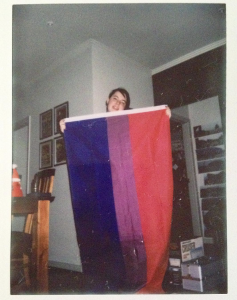Q&A with Betty Kitchener AM
Betty Kitchener was one of the original founders of the Mental Health First Aid (MHFA) organisation that teaches community leaders how to assist people experiencing a mental illness or a mental health problem. Kitchener stepped down as the CEO of MHFA in 2016 and has been inducted as a member into the Australian Order. She is now a consultant for the MHFA organisation and is continuing her work helping people with mental illness.
Community views of mental health in Canberra, Australia are surrounded by taboo and fear. Despite this, the situation is improving at an accelerating rate.
Posted by Mental Health First Aid Australia on Tuesday, 6 October 2015
Betty Kitchener from Mental Health First Aid Australia Facebook Page.
Do you believe Mental Illness needs to be destigmatized?
It certainly needs to be done and there’s debate on what is the best way to destigmatise community attitudes on that. Even amongst academics, they don’t always agree on what’s the best way [to do so]. We certainly believe [that one of] the MHFA course’s aims is to destigmatise myths and misunderstanding about mental illness to make people realise it’s an illness like any other illness, and that there’s plenty of things that can be done to help either by yourself, by friends and family or by professionals.
Have you experienced any mental illness?
Oh yes, I’ve had severe episodes of reoccurring episodes of clinical depression and I’ve been hospitalised for being suicidal… [it] was very disabling. I suffered discrimination and stigmatising attitudes, particularly from the nursing profession [before the year 2000]. I was a very good nurse, a registered nurse, I worked in Canberra hospital and when I had a severe episode of depression, was hospitalised, I came back to work with the doctors permission, the nurse in charge didn’t want me there, she thought I was damaged goods and thought I should go work at aged car where I couldn’t do any damage. So very bad attitude to be getting from the nursing profession and someone in a senior role.
How did you start the first Mental Health First Aid course?
I’d done a double major in psychology at university… my husband is an academic and a researcher in the mental health area and at a meeting, someone said “what we need is first aid for depression!” At that stage in my spare time, I was teaching first aid with Red Cross in Canberra and it just dawned on me; “my goodness, I know about mental illness, I know about discrimination and here I am teaching first aid, of course we should also be teaching first aid to people with mental illness and mental health problems.” So, we got talking and decided that in our spare time we would develop the course and we would just run a couple courses in Canberra, and from there it was obviously the right thing at the right time and now, it has spread across Australia and across the world and is now being taught in over 22 different countries around the world.
What do you think the public’s perception of mental illness and mental health problems?
When you ask the public what other people think about mental illness they say “oh yeah, people have stigmatising attitudes or they’re crazy or violent…” but then when you ask people their own views, would you be happy to live next door to live next door to someone with a mental illness? They say yes. There sort of this public belief that everyone else out there has got stigmatising beliefs… there’s also a thing called “self-stigma” so often people with mental illness have stigma around themselves. People with mental illness themselves have very poor self-esteem and perception of themselves.
Is any of the stigma surrounding any mental illness true?
People think that people with mental illness are violent. Now there are some violent acts that are carried out by people when they are unwell with mental illness, but there are many violent acts by nasty people; criminals, people that are just bad people, people who just care about themselves and not others and they don’t have a mental illness. There is a small portion of people very unwell, usually with a type of psychotic illness where they may be perceived as being violent because of the voices they hear or the command hallucinations telling them to do things.
What can people do to battle the stigma surrounding mental illness?
I think people sharing their stories of where they have experience a severe mental illness and they’ve certainly not been aggressive, so people can see that there is another face to it. So, people can realise that it’s only when the movies are made which often portray it quite incorrectly or the media reports on an unfortunate act, but there are actually man-many-many-many more episodes happening out there which are not aggressive at all and people that are unwell are still contributing to life, to themselves and to others. So, it’s information of people sharing their stories. You’d have to get the fine balance [of not oversharing and flooding the airways] and when to give such a story. I think if people just talked about it and began to accept mental illness is an illness, just like any other illness. That’s the message that we really need to get out there.
Find out more about MHFA at mhfa.com.au
Posted by Mental Health First Aid Australia on Monday, 23 October 2017
If you’re experiencing symptoms of mental health you can call 000 if there is an emergency, or LifeLine on 13 11 14.
If you’re looking to become a Mental Health First Aid Practitioner, you can find information on the next teaching periods on their Website.




Be the first to comment!